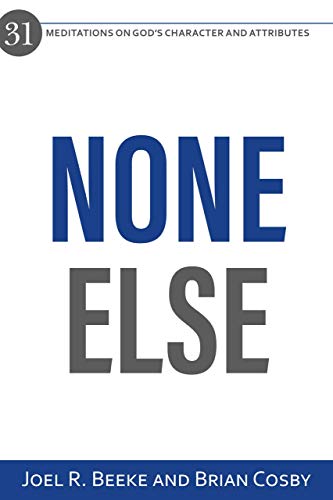A Book Review from Books At a Glance
by Ryan M. McGraw
It is vital for believers to know what their God is like. The Bible is filled with vivid descriptions of God’s character in the midst of revealing God’s works. Summarizing and organizing the teaching of the whole Bible on this subject can be daunting. In the end, God is still beyond us. We can apprehend him and know him without comprehending him as he is in himself. Beeke and Cosby give readers 31 daily meditations on God’s character and attributes in a way that is both accessible and devotional. While the organization of the material is less systematic than other works, it has the advantage of leading readers by the hand towards knowing their God. As such, this series of meditations can help us read the whole Bible better and know what to look for as we grow in our knowledge of the only true God.
While there is no detectable organizing principle to God’s attributes in this work, its chapters cover a lot of ground. Largely bypassing traditional categories of communicable and incommunicable attributes, or essential and relative ones, the authors dive into biblical material directly. Following an introduction to the topic, chapters 2-9 are foundational to the rest of the book in that they encompass knowing God, his nature and attributes, his uniqueness, his “Name,” holiness, spirituality, simplicity, and Triunity. Wading through most of the other attributes, subsequent meditations encompass much of what the Bible reveals about God, being sensitive to how it does so and why.
The Trinity appears in virtually every chapter, showing that while we must distinguish the divine persons from the divine attributes, we can never separate them. Proceeding in this way makes the overall treatment of the attributes solid, directing readers to God’s work in the gospel and the true knowledge of God as our goal.
The authors include sound distinctions that help readers think through biblical texts, such as God expressing his omnipresence to believers essentially, covenantally, and incarnationally (95). Each chapter concludes with a seed thought for digging deeper into each topic as well, with some suggestions for further reading. Some statements overreach themselves, such as asserting that God’s love is not merely an attribute, but God’s “very nature” (147). Yet chapter 8 on divine simplicity illustrates that God is his attributes and that all of them are essential to his nature, not love only.
This book has the potential to reach believers where they need to meet God; in their devotion and prayer. Use it to meditate on God’s character in order to grow in grace and in love towards him and others. This material can serve as a useful companion to private Bible reading and prayer, or for family worship and group studies, using the study questions included at the close of each chapter.
Ryan M. McGraw
Greenville Presbyterian Theological Seminary
